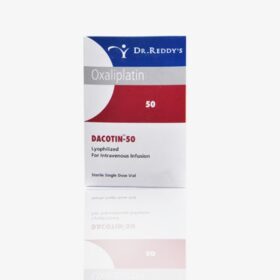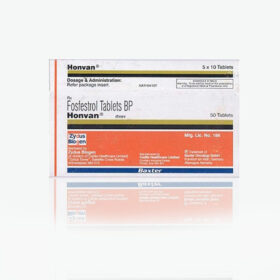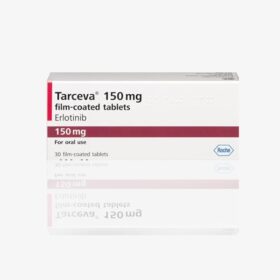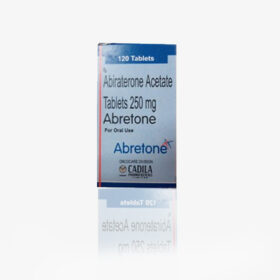- Your cart is empty
- Continue Shopping

Product
Buy Abirapro : Abiraterone 250 Mg Tablet 120’S Online
$161.43
Brand Name : Abirapro
International Brand Name : Zytiga
Composition : Abiraterone Acetate
Manufactured by : Glenmark (Onkos) Pharmaceuticals Ltd.
Strength : 250 mg
Form : Tablets
Packing : Pack of 120 Tablets
Prescription Required:
Abiraterone is a medication used in the treatment of advanced prostate cancer. It is typically prescribed for individuals with metastatic castration-resistant prostate cancer (mCRPC), meaning the cancer has spread beyond the prostate and is resistant to hormonal therapies. Here’s a description of abiraterone:
Generic Name: Abiraterone acetate
Brand Name: Zytiga (commonly known by the brand name)
Class of Medication: Abiraterone is classified as an androgen biosynthesis inhibitor. It works by inhibiting an enzyme called CYP17, which is involved in the production of androgens (male hormones), including testosterone.
Purpose and Indications:
Abiraterone is primarily used in the treatment of metastatic castration-resistant prostate cancer (mCRPC) in combination with prednisone. It is prescribed when the cancer has progressed despite initial hormone therapy and surgical castration.
Mechanism of Action:
Prostate cancer cells often rely on androgens for growth. Abiraterone inhibits the production of androgens in the adrenal glands and within the tumor itself. By reducing the levels of circulating androgens, it helps slow down the progression of prostate cancer.
Administration:
Abiraterone is typically administered orally in the form of tablets. It is usually taken once a day in combination with a low dose of prednisone.
Monitoring and Side Effects:
Patients taking abiraterone are monitored regularly for changes in blood pressure, liver function, and other potential side effects. Common side effects may include fatigue, joint swelling or discomfort, hypertension (high blood pressure), and fluid retention.
Prescription Requirement:
Abiraterone is a prescription medication, and its use should be supervised by a qualified oncologist or healthcare provider. It is not intended for self-prescription or use without proper medical guidance.
Combination Therapy:
Abiraterone is often used in combination with prednisone to manage side effects and enhance the therapeutic effect. Prednisone is a corticosteroid that helps manage inflammation and certain side effects associated with abiraterone treatment.
Clinical Considerations:
Abiraterone is typically used in later stages of prostate cancer when other treatments have become less effective. It is not used as a first-line treatment and is usually reserved for specific cases.
Patient Education:
Patients taking abiraterone should be educated about the importance of regular medical check-ups, potential side effects, and adherence to the prescribed treatment plan.
It’s crucial for individuals prescribed abiraterone to have open communication with their healthcare team, report any side effects promptly, and follow their treatment plan diligently. As with any cancer treatment, the decision to use abiraterone is individualized based on the specific circumstances and characteristics of the patient’s cancer.














Reviews
There are no reviews yet.